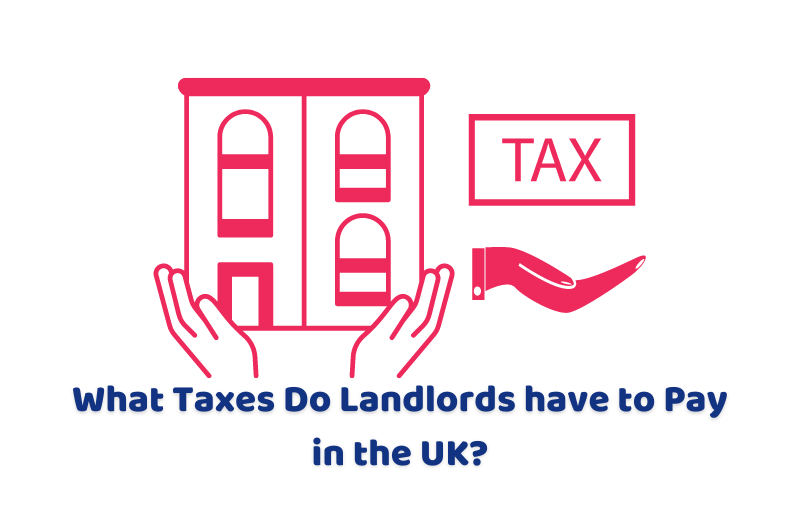What taxes do landlords have to pay in the UK? By being well informed about their tax obligations, landlords can minimise their tax liability, maximise their profits, and ensure compliance with HMRC regulations.
Reach out to one of our professionals to get to know about what taxes do landlords have to pay in the UKin the UK. Get in touch with us and you will be provided instant professional help!
What Taxes Do Landlords Have to Pay in the UK?
As a landlord, staying on top of your tax obligations is essential to avoid any unwanted surprises from HMRC. So, what taxes do landlords need to pay in the UK? First and foremost, there’s Income Tax on rental income. The buyer usually pays this, but in some cases, landlords may need to foot the bill. And let’s not forget about National Insurance contributions (NICs) if you employ someone to manage your rental property.
If you’re a non-UK resident landlord, you’ll need to pay UK tax on your rental income, and your tenant or letting agent will need to deduct this tax before paying you. And, of course, there’s Corporation Tax if you’re a limited company landlord. It’s clear that landlords in the UK face a range of tax obligations, and it’s crucial to stay informed and seek professional advice. This is to ensure you’re meeting all your tax requirements.
Inheritance Tax
Inheritance Tax (IHT) is a significant consideration for landlords in the UK. As it can substantially reduce the value of their estate upon passing. When a landlord dies, their estate, including their rental properties, is subject to IHT.
This means that if the value of the rental properties and other assets exceeds this threshold. The executor of the estate will need to pay a 40% tax on the excess. For example, if a landlord owns a rental property worth £500,000 and has other assets totalling £100,000, the total value of the estate is £600,000. After deducting the nil-rate band, the taxable amount is £275,000, and the IHT liability would be £110,000 (40% of £275,000).
This can significantly reduce the amount passed on to beneficiaries, such as family members or heirs. To mitigate this, landlords may consider strategies like transferring properties to family members or trusts during their lifetime or utilising tax reliefs like business relief or agricultural relief, if applicable. Landlords need to consult with a tax professional or financial advisor to understand their IHT liability and explore options to minimise the tax burden on their estate.
Capital Gains Tax (CGT)
Inheritance Tax (IHT) is a significant consideration for landlords in the UK. As it can substantially reduce the value of their estate upon passing. When a landlord dies, their estate. Including their rental properties is subject to IHT.
National Insurance
Capital Gains Tax (CGT) is a significant tax liability for landlords in the UK. As it applies to the profit made from the sale or disposal of rental properties. When a landlord sells a rental property, they are required to pay CGT on the gain made. Which is the difference between the original purchase price and the sale price.
The tax rate applicable to landlords is dependent on their tax band, with basic-rate taxpayers paying 18% CGT, higher-rate taxpayers paying 28%, and additional-rate taxpayers paying 28%.
For example, if a landlord purchases a rental property for £200,000 and sells it for £300,000, the gain is £100,000. If the landlord is a higher-rate taxpayer, they would pay 28% CGT on the gain, resulting in a tax liability of £28,000. Furthermore, landlords are also subject to CGT on the sale of other assets. Such as shares or second homes, and must declare these gains on their Self Assessment tax return.
Rental Income Tax
National Insurance (NI) is a vital component of the UK’s social security system. Landlords are required to pay Class 2 and Class 4 NI contributions on their rental income. Class 2 NI is a flat rate of £3.15 per week. Class 4 NI is calculated as a percentage of the landlord’s profits from renting out properties. Currently 9% on profits between £8,632 and £50,000, and 2% on profits above £50,000. Landlords must pay these contributions on their Self-assessment tax return, and failure to do so can result in penalties and fines.
Additionally, landlords who employ staff, such as property managers or cleaners, must also pay the employer’s NI contributions. Currently, 13.8% of the employee’s earnings are above £166 per week. Furthermore, landlords who are company directors or have a share in a rental business must also pay Class 1 NI contributions on their director’s or employment income.
It’s crucial for landlords to accurately calculate and pay their NI contributions to avoid any potential issues with HMRC. By understanding their NI obligations, landlords can effectively manage their tax responsibilities and maintain a successful rental business.
The Bottom Line
In conclusion, what taxes do landlords have to pay in the UK, landlords in the UK face a complex and multifaceted tax landscape, with various taxes and regulations to navigate. From Income Tax on rental income to Capital Gains Tax on property sales and national Insurance contributions on employment income.
Stamp Duty Land Tax on property purchases, the tax liabilities can quickly add up. Additionally, Inheritance Tax and Annual Tax on Enveloped Dwellings (ATED) may also apply in certain circumstances. To manage these tax obligations effectively, landlords must stay informed and up-to-date on changing tax laws and regulations.
Get in touch with our young, clever, and tech-driven professionals if you want to choose the solution to tax burden or accounting problems in the UK for your income. We will ensure to offer the best services.
Disclaimer: The information provided on AccountingFirms.co.uk is for informational purposes only and should not be considered as financial advice. Always consult with a professional accountant to ensure compliance with UK laws and regulations.

